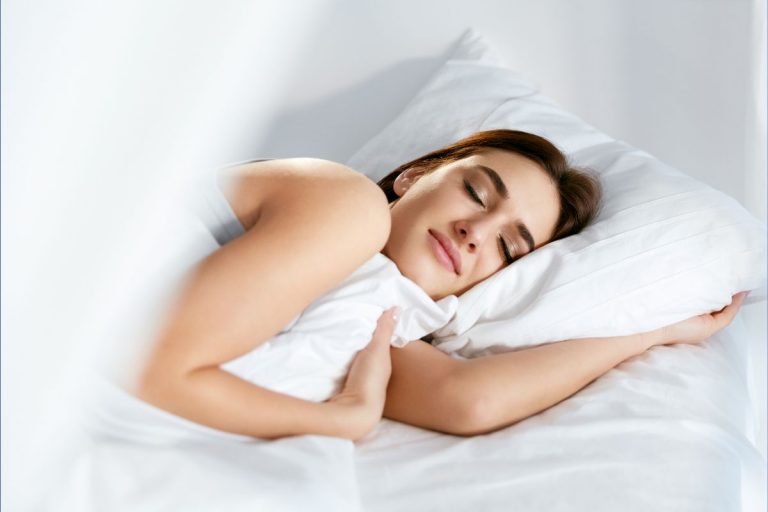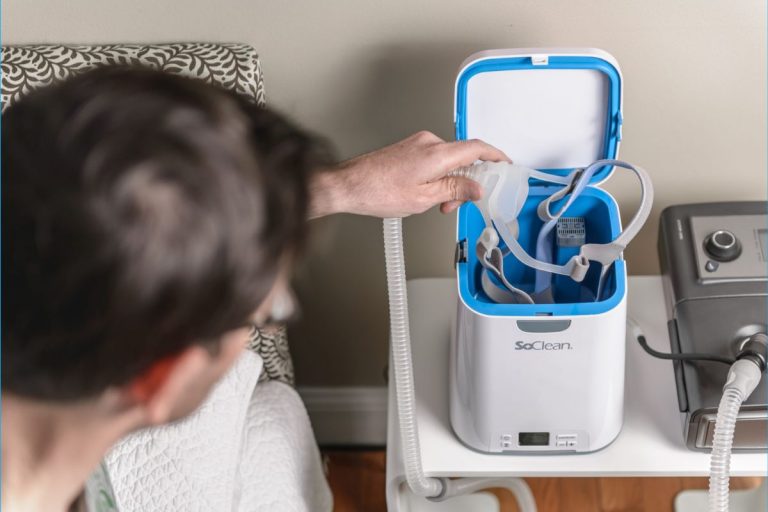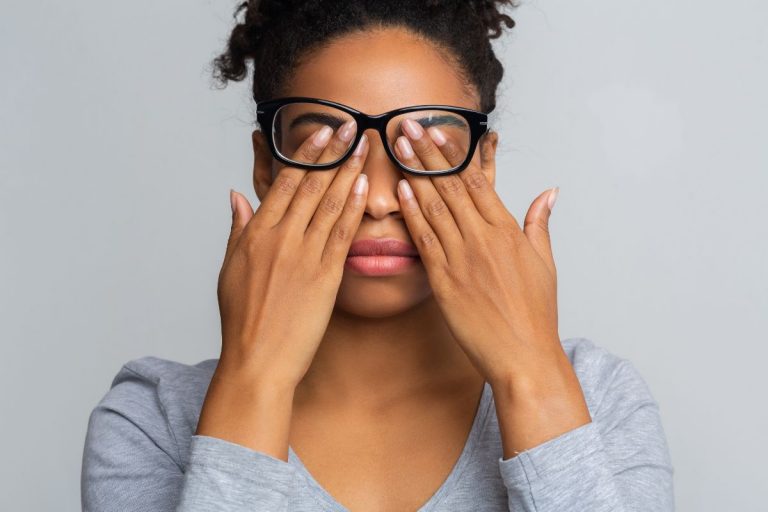Snoring is one of the most common sleep-disorder breathing problems. Millions of people are dealing with it, and it can present a big problem in their life. Snoring disturbs your sleep, the sleep of your partner and disrupts the natural sleeping dynamics you and your partner have.
Even though it is common, snoring can actually be one of the main symptoms of sleep apnea and obstructive sleep disorders. It usually manifests as a pathological respiratory disturbance, which can further cause adverse health consequences.
Snoring usually appears due to open mouth during sleep, together with either nasal congestion or other respiratory problems. However, some people can snore with their mouths closed. So, to answer the big question; yes, you can snore with your mouth closed. Therefore, in the following paragraphs, we will explain how snoring with a closed mouth is possible, and what is it that it can indicate. Let’s get started!
What are the Causes of Closed Mouth Snoring?
The causes of simple snoring are numerous; from being overweight, to being a smoker, having a blocked nose or due to certain medications, snoring can appear with anyone. However, snoring with a closed mouth can be caused by a few other factors. For example, closed mouth snoring can be caused by;
- Tongue problems – it has been reported that people with tongue problems tend to snore with their mouths closed.
The reason for that lies in the fact that the tongue falls back into the airway, which causes snoring even though the mouth is closed. Such cases are often treated by shortening of the tongue, in extreme scenarios, or by using a mouthguard.
- Throat problems – having poor muscle tone in the throat can also cause closed mouth snoring. When experiencing throat problems, snoring can seem to be louder even though the mouth is closed.
- Obstructive sleep apnea – OSA is a serious sleep disorder that causes a person to stop and start breathing through their sleep.
Obstructive sleep apnea occurs when throat muscles relax and contract, blocking the airway. That is when closed mouth snoring tends to occur and can be one of the main symptoms.
Read More: How Does Sleep Apnea Impact the Brain?
- Palatal height and maxillary depth – studies have shown that patients with disturbed and reduced palatal height and maxillary depth experience sleep apnea and snoring problems.
Patients with smaller and narrower mandibular to maxillary and maxillary to facial widht ratios are more likely to snore (whether simple snoring or closed mouth snoring).
- Poor lifestyle choices – if a person is a smoker, drinker and doesn’t take care of their diet, chances are they’re experiencing closed mouth snoring.
All of these unhealthy lifestyle choices contribute to sleep-disorder breathing problems as they affect respiratory cycles and the natural breathing system of the body.
Who is at Risk for Closed Mouth Snoring?
The causes of closed mouth snoring can be numerous, and are usually common and expected. However, it is also important to know which groups of people are at risk of developing closed mouth snoring to prevent this problematic occurrence;
- People with nasal problems and allergies – nasal problems and allergens play major roles in developing closed mouth snoring.
So, if you experience regular/chronic nasal congestion, problems with nasal mucosa (dryness in the nasal airway) or seasonal allergies, you need to consult a doctor and start taking proper treatment and medication.
- People with insomnia and sleeping disorders – people who have sleeping problems and those who don’t get enough sleep are at risk of developing closed mouth snoring.
The reason for that lies that lack of sleep causes the face and throat muscles to relax. When the muscles relax, snoring occurs.
Therefore, it is important to develop healthy sleeping habits and consult a medical professional if sleeping problems prolong.
- People with excess weight – excess weight can be one of the biggest risks in developing numerous health disorders, as well as snoring problems.
Overweight people are known to have thicker tissue in the throat and airways area. This results in narrow nasal passages and airways, which causes snoring.
How Can You Stop Snoring with Mouth Closed?
There are many ways a person can stop snowing with their mouth closed, or at all. Here are some of the common solutions to this unusual problem;
- Changing the sleeping position – people who sleep on their backs are more likely to snore with their mouths closed.
So, it is important to start sleeping on the side, on the stomach, or on the back but with the head elevated a little bit.
This way you will keep the airway open and prevent the tongue from falling back into the airway.
Read More: The Best Sleeping Positions to Wake Up Pain-Free
- Cutting on alcohol, smoking, and medications – alcohol causes the muscles in the throat to relax, which results in snoring.
Moreover, smoking caused respiratory problems, and medication can overall alter your ability to breathe properly during sleep.
Therefore, it is important to avoid alcohol, cigarettes, and medication in order to deal with closed mouth snoring.
Read More:
14 Best Foods To Eat Before Bed For Better Sleep
How Does Alcohol Affect Sleep?
- Losing weight – obesity is directly linked to any form of snoring. Therefore, in order to stop snoring with your mouth closed, make sure to change diet, exercise regularly and lose weight.
With the reduction of weight, you’re more likely to lessen the severity of snoring.
- Using anti-snoring appliances – using anti-snoring appliances can be a good way to deal with closed mouth snoring.
Oral appliances, like mouthguards, can help your airway stay open, and can prevent the tongue from falling back into the airway.
Here are some anti-snoring appliances you should check;
Venyn Nose Vents – these nose vents are made to help ease any forms of nasal congestion, breathing and snoring problems. The vents expand the nasal airways and enable clearer airflow. By expanding the airways, the vents also prevent snoring.
Custom Molding Mouthpeace – this comfortable molding mouthpiece is made from silicon and acts as a mouthguard. The mouthpiece is excellent for cases of bruxism, teeth and jaw clenching as well as for preventing snoring.
- Utilizing anti-snoring exercises – you can try utilizing some anti-snoring exercises, like vowel pronunciation, moving the jaw with open mouth, contracting throat muscles or even singing.
These exercises can help you strengthen the throat muscles and the upper respiratory system to prevent closed mouth snoring.
- Utilizing adjustable height desks – it is believed that your posture while sitting can affect the curvature of your neck, upper back and the quality of your breathing.
People who spend a lot of time sitting (especially if they don’t sit properly) can experience snoring problems when they lay down and sleep, as their airways experience disturbance due to bad posture.
Therefore, it is recommended to utilize adjustable height desks; so instead of sitting for 8 to 10 hours, you can now spend at least a few hours standing. Check some of our recommendations;
Pneumatic Adjustable Height Standing Desk – this sturdy height standing desk will help you not only improve the daily work experience, but will also take care of your health.
It is very simple to use and has a powerful lever-activated pneumatic height adjustment system. Such a desk will improve your lifestyle, from sedentary to medium active.
Standing Desk Workspace – this standing desk is excellent because it will keep your posture straight at any angle and height. It is made to always keep your arms at a 90-degree level and your back straight.
By using such a desk you will notice your posture improving and your breathing being deeper and clearer. The desk is easy to adjust and you will have plenty of workspaces.
Do I Snore With My Mouth Closed?
Many people aren’t even aware that they’re snoring with their mouths closed. If you’re wondering whether you’re snoring with your mouth closed (and no one has really complained about it), here’s a tip on how you can find out;
- Open your mouth and try to make a snoring noise.
- Close your mouth and try to make a snoring noise.
- If you can make a snoring sound with your mouth closed, then you’re a closed mouth snorer.
- Now, make sure to stick your tongue out and grab it between fingers.
- Try making a snoring noise.
- If you can make a snoring noise in this position, you’re also a tongue base snorer (this means that there is a lack of tone in the tongue and surrounding tissues).





